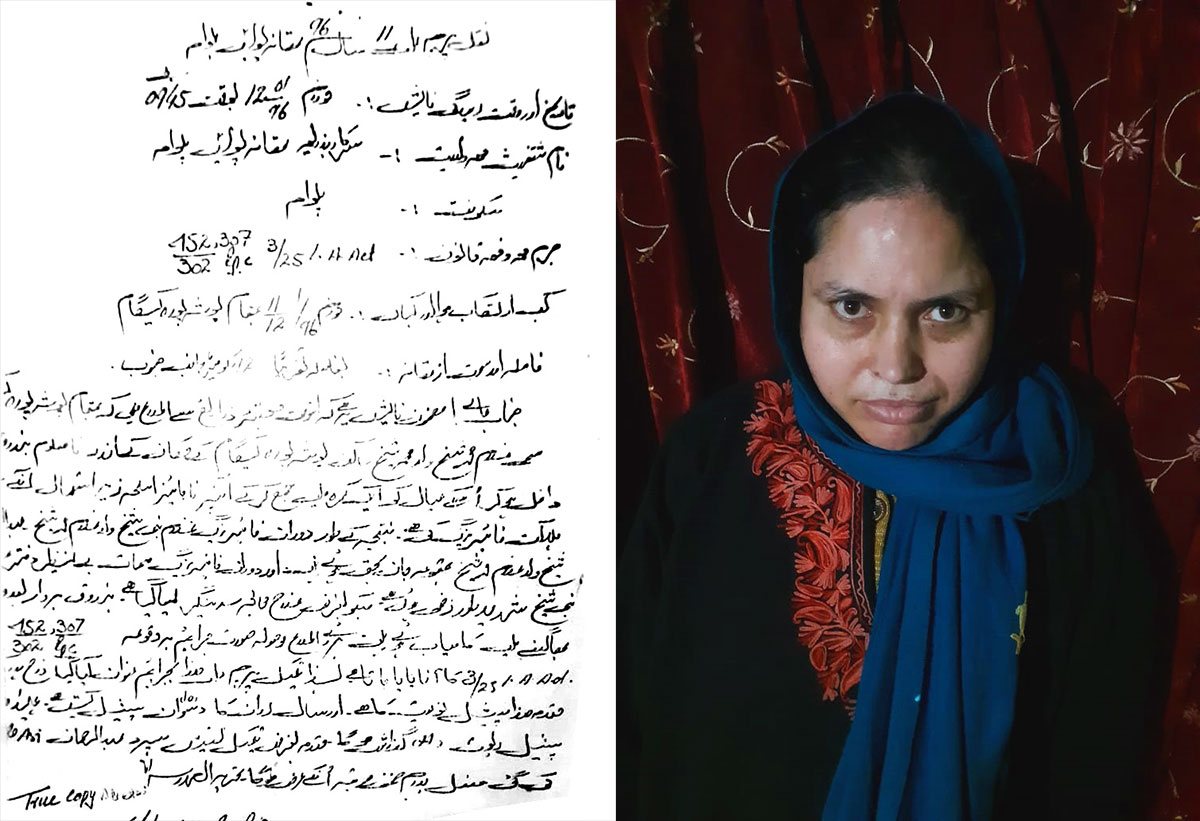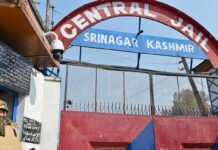More than two decades after his two brothers including a medical doctor were killed in cold blood by an Ikhwan gang, a Communist Party-affiliated school teacher is seeking justice, reports Umar Mukhtar

It was a gunshot that broke his slumber. During the intervening night of January 10 and 11, 1996, Ghulam Mohammad Sheikh, then in his early forties, was sleeping at his Pashpora-Keegam home in Shopian, when he heard the gun rattling. It alerted Sheikhs’ because the firing was taking place just outside their home.
A teacher, locally known as Master Ji, Sheikh was an active worker of the Communist Party of India (CPI), an affiliation that was enough to invite the attention of militants. Those days, when the central government was heading for assembly elections to end the prolonged spell of president’s rule, the attacks and assassinations of the pro-Indian political workers was a routine.
Frightened, Sheikh followed his sixth sense. He jumped out of the bed and rushed to the first floor of the house, where he hid inside a wall-sized cupboard. It might have been a few minutes in the cupboard that the apprehensions started unfolding literally.
“Darwaza Kholo (open the door),” some men outside began started shouting furiously as they banged the front door.
Inside the cupboard, Sheikh was shivering. He thought the militants were looking for him. His thought process was interrupted when the people from outside started hard hitting the window panes. Sheikh did not move an inch. He left the decision of opening or not opening the door to his two brother – Abdul Rashid Sheikh, then 24, a doctor, and Ghulam Nabi Sheikh, 26, a contractor.
Finally, the two younger Sheikhs’ decided to open the door. As it flung open, four heavily armed men made their way inside the small corridor. They wore military fatigues but were locals.
“Master Kahan Hai…Uus Say Baat Karni Hai (Where is Master. We want to talk to him),” asked one of the gunmen, authoritatively.
Politely, Sheikh’s brothers asked the gunmen who they are. They said they are from Ikhwan. Sheikh was still hiding upstairs, but listening to the conversation. All of a sudden he felt a bit relieved.
Ikhwan was a cult of gunmen that was working with the counter-insurgency grid. A law unto themselves, they would work against the militants and their sympathizers. There was not an instance in which anybody from Ikhwan had hit any political worker who worked for the ‘mainstream’ political parties. That was the reason why Sheikh felt relieved in his cupboard.
Sheikh heaved a sigh of relief, his palpitations became normal and the sense of security brought him down. He sat with the rest of the family members who all were in the kitchen. Quickly, the conversation started.
“Master Tum Hou?” one of the Ikhwanis’ asked Sheikh. He nodded in affirmation. Quickly, Sheikh was directed to move out as their commander wanted to have a word with him. He refused to move out.
“If your commander wants to talk to me, talk here,” Sheikh recalls saying the Ikhwan group. “I will not move out.”

After the blank refusal, one of the Ikhwan men went outside and talked to his commander. After some minutes, the commander along with other associates came inside and said: “Kon Hai Master?” Somebody from the group pointed towards Sheikh, asking as if reassuring: “Master Chukha Tchie”? (You are the master?)
“The commander then told our youngest daughter-in-law to make tea for all of them,” Master remembers. “She started making the tea.” By that time, Sheikh, a local, identified the commander. He was Mushtaq Ahmed Gannie (Mush Gannie), a resident of Chandgam in Pulwama.
The tension and pin drop silence was pierced by the clutter of the utensils that were in use for the midnight tea party. Barely a few minutes might have elapsed, Sheikh said, Mushtaq pointed his AK-47 rifle towards him and fired three shots. It changed the scene abruptly.
“As he pointed the gun towards me, I abruptly leaned on one side,” Sheikh said. “I thought I received the bullet and I will die now.”
Mushtaq did not stop. He fired indiscriminately towards other family members. He fired for about three minutes. The room got filled with smoke and the cries of Sheikh’s family members.
As guns felt silent, Sheikh said, Mushtaq and his accomplices fled from the room. Amid cries for help, the family lifted the perforated bodies of Dr Abdur Rashid, 24 and Ghulam Nabi Sheikh 26- brothers of Ghulam Mohammad Sheikh. Sheikh’s both the brothers who had been like his shields were dead.
Dr Rashid had completed his MBBS one year ago and was recruited on contract basis in the state health department. Ghulam Nabi was a contractor. Ghulam Nabi, had received multiple bullets in his chest and died almost instantly. Dr Rashid was still breathing and sought medical aid.
By then, the neighbours had woken up to see the nightmare. They were desperate to drive Dr Rashid to the hospital but he breathed his last only outside his home.
Apparently, Sheikh was the target but he was lucky enough that he did not receive any bullet. “It was a miracle, else the attack was on me,” Sheikh said. “But I lost two of my brothers.”
After half an hour, the neighbours while managing the situation by consoling the surviving members found Benazir, one of the lady members of the devastated family, unable to move. Initially, they thought she was dumbfounded. But as they started inspecting her body, they traced two bullets in her two thighs. She was drenched in her own blood. Somehow, the neighbours drove Benazir to the hospital and she survived. Benazir is now a married woman.
The tragedy was unprecedented. It was first of its kind in which the Ikhwan hit a ‘mainstream ‘political family. This sent Sheikh thinking about why it happened. It took a bit of time but he found the answers.
The group of Ikhwanis that murdered two civilians were operating from the Hawl garrison. The camp was established in the deserted homes of the Kashmiri Pandits living on the main Pulwama-Shopian road. They would stop the passenger buses for hours during the day, go for questioning, seek details, make arrests and do whatever they were asked to by their handlers.
Sheikh, a political activist, had made a ‘complaint’ a few weeks before the tragedy struck him. He had wanted an end to the harassment of the commuters on daily basis. “They used to arrest people and then demanded ransom for their release from their family members,” Sheikh alleged.
Sheikh had taken a delegation of respectable persons of the area to the Deputy Commissioner, Pulwama and to the Superintendent of Police to register their complaint against the Ikhwanis and the army.
Both the officials, Sheikh remembers, expressed their helplessness in disciplining the twin forces, insisting this was not a domain of the local administration. Incidentally, that day a senior army Commander was visiting Pulwama. He had flown from Udhampur to check the security arrangements. The officers who claimed their helplessness arranged the delegation’s meeting with the visiting General.
Sheikh was leading the delegation. They met the General in the Deputy Commissioners office. They made the complaint against the army and the Ikhwanis for their ‘inappropriate actions.’The General assured them of the ‘appropriate action’ against the erring soldiers.
Four days later, the Ikwanis came to Sheikh’s home and resorted to two murders. “I think the General was talking of this ‘appropriate’ action,” recalls Sheikh.
After three days of mourning, Sheikh along with other all male members of the family left their home and went on self-exile to Jammu.“I had the apprehension that they would again come for me, so I decided to move to some safer place,” Sheikh said.
His struggle did not stop here. The first priority, post-mourning was to save his skin and then register the First Information Report (FIR). Not able to get any kind of justice from any side, Sheikh chased his own party. With the help of his comrades, Sheikh had a meeting with the then home minister Y B Chauhan and the plea was that an FIR may please be lodged against the involved persons. “It was only when the home minister intervened that the FIR was lodged,” Sheikh said.
“I gave in writing the names of the persons involved in the incident, but police had omitted the names,” Sheikh alleged. “They have registered a case against some ‘unidentified gunmen’ rather mentioning the names we had given them in black and white.”

Later, Sheikh met the then governor, K V Krishna Roa. Sheikh gave him details about the entire sequence of events that led to butchery in his family. “I told him that I am a member of pro-India mainstream political party,” Sheikh said. “He assured me all help.”
By now Sheikh is home. Dr Rashid was not married when he was killed but the contractor was. Contractor’s widow fought odds to raise the family so did Sheikh, who returned home after a prolonged stay in Jammu as an unwilling migrant. Despite the long wait of more than two decades, Sheikh is still wandering from pillar to post to get justice delivered.
It was much later that Mushtaq was arrested. Incidentally, he was convicted in some other case and was sentenced to a life term. “It is the irony that the judiciary released him on the bail when he produced some fake documents related to his health,” Sheikh said. “After getting bail, Mushtaq married, and is now living a normal life.”
No other person was arrested. Some of them died a natural death, others live a normal life. Sheikh is chasing the case for justice, 22 years later.















